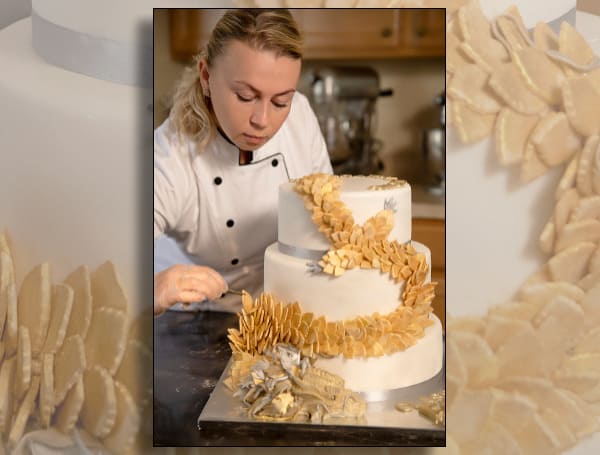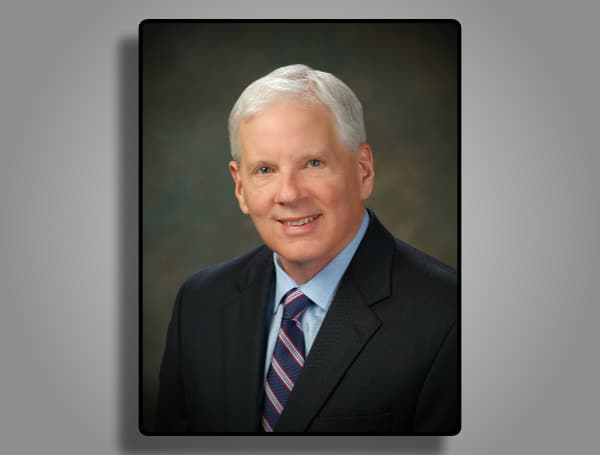By J. Scott Angle
DADE CITY, Fla. – Natalia Dissa left Kyiv four years ago, when Ukrainians still left to chase a dream instead of flee a nightmare.
She had managed 30 people in a bank branch in Kyiv, but her dream was to create confections as centerpieces for birthdays and weddings. She would specialize in cakes. A cakes-ist, in the language of an immigrant.
Dissa got plenty of encouragement to chase the dream. “You should really make a business of this!” her friends and relatives would say over bites of layer cake. But she needed to convince herself.
Now she’s getting more than encouragement. She’s getting help. How to navigate the business startup regulations of a new nation. How to find a customer base beyond your immediate friends. And most of all, the commercial kitchen she needed to go from hobbyist to cakes-ist.
Fortunately, her dream was preceded by Whitney Elmore’s larger economic development dream. Elmore, the University of Florida Institute of Food and Agricultural Sciences Extension Pasco County director, wants to build a greater Tampa area food economy. Her support for startups and cottage industry producers supplements the continuing traditional Extension approach of teaching farmers how to efficiently raise crops and food animals.
Elmore’s expansive vision of the food economy is one in which there are few barriers to becoming your own boss, producing local food and selling it at farmer’s markets, to local restaurants, or out of your own storefront.
This not only gives entrepreneurs control of their own destiny, but it creates jobs in a rural community without having to give up the character that attracted people—or retained them—in the first place.
Elmore’s vision is to contribute to the Pasco County economy dream by dream. That vision helped her identify opportunity in what had been a burden to the county—a building in a low-income neighborhood that had essentially been abandoned for five years.
She asked the county for permission to pursue a dream there, and the commissioners gave her license to do so. She, her Extension team and the County Commission started what’s known as the One-Stop Shop, an incubator for dreamers like Dissa.
If Dade City was going to be the place to launch food businesses, the One-Stop Shop was going to need a place to prepare food. A commercial kitchen. She inherited a 15×25 room with a ventilation hood.
But how to convert it into a space for dreamers like Dissa? Elmore enlisted the aid of an established local business, Welbilt, which donated a fridge, freezer, mixer, microwave, stove/oven and three-compartment sink with pot filler.
Meanwhile the Pasco Economic Development Council transformed the rest of the building into a place to learn how to start any sort of business. It offers classes, microloans, workspace and more.
Dissa named her business Cakesist. She’s used the incubator kitchen for a year, space that allows her to prepare multiple orders simultaneously. It’s a work in progress. Since February 24, she’s been more focused on evacuating her mother from Kyiv and the wellbeing of her website designer who’s still there.
In Pasco she has enjoyed the support of Elmore and a team of economic development professionals. They provide access to a licensed commercial kitchen, safe food handling instruction and the experience to demonstrate proof of concept to bankers when she’s ready to pursue financing to “graduate” from the incubator and open her own shop.
The incubator kitchen has been a safe place to chase her dream without a bank loan, expensive equipment purchases or payroll. As a one-woman business, had she already been in her own shop, her withdrawal from baking to attend to friends and family in Ukraine would have been a business calamity. There’s no time limit on her tenancy in the incubator. She can proceed at her own pace.
Dissa’s biggest fear isn’t failure. It’s success. It’s how to scale up if suddenly 100 orders come in.
Elmore’s other kitchen incubator tenants each face barriers to expansion. In many cases they don’t qualify for bank loans, for example. Elmore works to remove as many obstacles as possible.
Elmore and Pasco County are betting that public support for opportunity will offer returns in economic development, a wider variety of local foods and the ability of a people to find purpose as well as paycheck in their work. That’s a bet worth making.
J. Scott Angle is the University of Florida’s Senior Vice President for Agriculture and Natural Resources and leader of the UF Institute of Food and Agricultural Sciences (UF/IFAS).
Visit Tampafp.com for Politics, Tampa Area Local News, Sports, and National Headlines. Support journalism by clicking here to our GiveSendGo or sign up for our free newsletter by clicking here.
Android Users, Click Here To Download The Free Press App And Never Miss A Story. Follow Us On Facebook Here Or Twitter Here.
Copyright 2022 The Free Press, LLC, tampafp.com. All rights reserved. This material may not be published, broadcast, rewritten, or redistributed.


